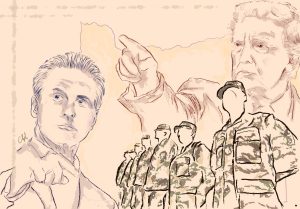Movie Review: “A Man Called Otto”
Jan 29, 2023
“A Man Called Otto,” directed by Marc Forster, portrays a heartwarming, contemplative film of a grumpy old man’s story about what it means to heal and love.
Notice: the following review contains spoilers
“But we are always optimists when it comes to time; we think there will be time to do things with other people. And time to say things to them. Time to appeal.” “A Man Called Ove,” Fredrick Backman
Based on the 2012 novel “A Man Called Ove” by Fredrick Backman, “A Man Called Otto” follows the story of an old man who seems to hate everyone in the world and finds everything a nuisance. Otto, played by Tom Hanks, lives in a quiet suburban neighborhood that is slowly being gentrified by pesky real estate agents and occupied by nosy new neighbors. The first part of the movie is focused on Otto’s fruitless attempts to take his life after his wife Sonya (Rachel Keller) passed six months prior. With his nitpicky daily chores and sudden outbursts about anything that could get in his way, Otto is disliked by everyone around him. He is angry about rising prices, bikes parked next to gates instead of racks, and cars becoming too “easy” for drivers. One glance at this man gives more than enough evidence to make him the most dislikable character of the film. Hanks delivers an amazing performance as his role of a grumpy old man that we’ve all encountered at least once in our lives.
As we learn more about Otto’s character through flashbacks, we begin to realize that this was once a man full of happiness and hope. Otto was a husband and soon-to-be father, married to a cheerful woman who brightened his world. Like any good man, he wanted the best for his growing family. The flashback scenes are brief and display the youthful romance between Otto and Sonya. We follow Otto in his first meeting with Sonya, to him proposing to her after he graduates, to him painting a crib for their baby. While these scenes humanize Otto and show what his life once was, there are a few faults that make them almost unbearable to watch. When the tragedy that fell upon Otto and Sonya is revealed, there is one thing that seems to ruin the supposedly tearful and heartbreaking moments for the audience: the music. A tragic tale of a young couple losing their child before he is born is shattered by an unfitting song playing a little too loudly over the dialogue. A simple orchestral piece without any lyrics or vocals would have left behind the necessary impact of this particular moment. Moreover, the pacing of revealing Otto’s life in the past felt rushed despite those memories being some of the most important details to the film. There seemed to be more focus on the neighborhood’s problems that Otto handles, rather than constructing his past, which could have been done better had Otto’s past memories been irrelevant to the story.
Despite the music and storytelling issues, the ending left me both emotional and relieved to see a deliverance of a heart-wrenching conclusion to Otto’s story. The issues that Otto resolved had once seemed insignificant, like teaching his neighbor how to drive or lending people his ladder. However, from all his work in righting the wrongs of his neighborhood to create a better place for all, Otto finds hope in realizing that life is worth living for — even if Sonya is not by his side. His life brightens as he creates unlikely friendships with both old and new neighbors and rights the wrongs imposed by the villainous real estate agents.
By the end of it, we realize that we are all like Otto. We hold regrets and anger for things we wish we could change from our pasts. We think of the future as a solid, concrete promise, when the future is more of a sea of unknown possibilities. Like Otto, we hold imperfections that we criticize so deeply until someone steps into our lives because they find them beautiful.
Otto’s story gives each and every one of us a reminder of how to heal, hold on to our loved ones, and find perfection in our mistakes. By the end, the bringing together of the community from Otto’s work turns him into the most loveable character of the film. Personally, I saw myself connecting deeply with following Otto’s story as he found home not as a physical building, but in his friends. “A Man Called Otto” is a thoughtful and heartwarming story that will make you laugh, cry, and rethink about what it means to live.
Image courtesy of Cinema 1 Plus

















